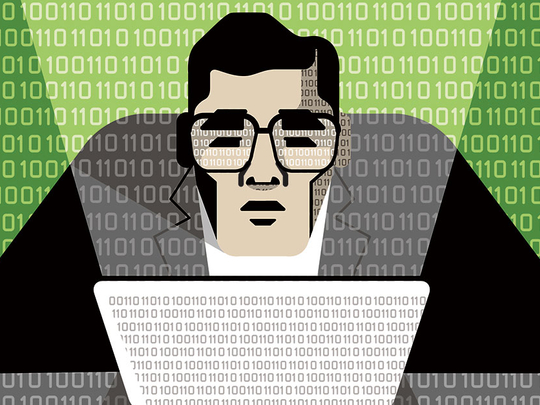
Book of Numbers
By Joshua Cohen, Random House, 592 pages, $28
In 1999, the year of “The Matrix”, a documentary was made about William Gibson, cult novelist and inventor of the term “cyberspace”. In “No Maps For These Territories”, Gibson reflected on the echoes between his speculative fiction and the new digital space opening up for real. Watching it now is a reminder of just how odd the internet still felt in those millennial days, imbued with the cyberpunky new music of the dial-up modem.
That dial-up music is now a nostalgic relic on YouTube and Gibson’s territories have long since been mapped with the mundane contours of our lives. Joshua Cohen’s “Book of Numbers” seems part of a renewed literary bid to defamiliarise them again, probing the crosscurrents of post-Snowden anxiety under the smooth surface of our digital existence.
Earlier this year, Tom McCarthy’s “Satin Island” depicted a corporate anthropologist adrift in a world of big data, in which everything seems connected and, at the same time, opaque. For his novel, Cohen takes a not-dissimilar corporate drama as his plot kernel, which he then rolls into a giant, zeitgeisty snowball. “Book of Numbers” is, among much else, a disquisition on language and programming, on the similarities between the internet and the Hindu pantheon, on 9/11, the 2003 Iraq war and the gluteal charms of jug statuary in the Metropolitan Museum.
In his 2012 quartet of stories “Four New Messages” and his 2010 novel “Witz”, Cohen revealed a fascination with the new language of the iGeneration and with Jewish history. Both themes pervade this new work, whose title recalls the biblical book in which Joshua is sent by Moses to snoop on the Canaanites.
Cohen’s latest project seems less a book, in fact, than a genizah: that room in a synagogue where worn-out Hebrew books are stored. The reader does not so much read as actively sift these fragments and uncompleted stories, co-creating a narrative that is voluble, inventive, often exasperating, sometimes rewarding.
Set principally in 2011, “Book of Numbers” is narrated by one Joshua Cohen, an impecunious New York writer, still reeling from having his first novel published on — would you believe it? — September 10, 2001. A decade on, he is approached to ghostwrite the memoir of another Joshua Cohen: the founder of the world’s biggest search engine, Tetration.
The word “Google” is never mentioned in “Book of Numbers”. Its events appear to unfold in a parallel universe in which only the names have been changed.
In dictating the story of his life, tycoon-Joshua later reveals dangerous information to his ghostwriter about Tetration’s links with government, forcing him to go on the run. Central to this mass-surveillance plotline is a Scandinavian hacker, who evades sex charges by claiming asylum in an embassy. Sounds familiar? In Cohen’s universe, he’s called Thor Ang Balk.
Like other internet-driven tales, “Book of Numbers” is fascinated by our era’s high priests: those able to decipher the surging algorithms on which the masses blindly surf. Thrust among the uber-rich, narrator-Joshua’s voice seems caught somewhere between satirical and awed.
Elsewhere, the swamping, totalising tone of a certain type of American fiction seeps in. Fretting that his new boss has snooped on his internet habits, “I ... scrolled schiztic for what to disclaim, for which self to accuse of what inclination: the offlabel oxycodone and hydrocodone ordered scriptless from British Columbia ...”
Following the party, narrator-Joshua jets off with tycoon-Joshua to Dubai. The desert, the novel’s overarching image, looms behind the two Joshuas in their ghostwriting sessions, in the course of which it becomes clear why the tycoon needs the narrator and why the narrator, in the end, never finishes the memoir.
Presented, in full, as hundreds of pages of transcripts complete with crossings-out, tycoon-Joshua’s life story seems, at times, a retelling of the Steve Jobs years: how a bunch of counter-cultural programmers in the 1980s became masters of the universe by the 2000s.
Deciphering the Tetration boss’s tech-laden idiolect is a long, heavy-going read ... until, right at the end of his account, he suddenly stakes a claim on our sympathy, as well as revealing his intention to carry out a final act of defiance. It is then that his deadening language achieves poignancy.
When his mentor disappears, narrator-Joshua decamps to Europe, clutching his incendiary transcripts. Unable to go online, he struggles with paranoia and internet cold turkey, which lend his wanderings in Berlin and Frankfurt a heightened, comic surrealism. It is the most enjoyable section of the novel, full of gags and insights. A notebook is “Wide-Ruled, like a Homeric epithet”. In Vienna, the shops are closed: “It was too late in the day for late capitalism.”
Where is it all leading? Other stories break into narrator-Joshua’s flow. When a rabbi discusses, at length, the digitised name of the divine, the reader begins to suspect entrapment in an unstoppable, hyperlinking eternity. When it finally arrives, the novel’s denouement has the slightly disappointing feel of a conventional thriller.
“The single best novel yet written about what it means to remain human in the internet Era,” one US critic has said of it. At his best, Cohen fashions some beautiful poetry out of tech-soused outpourings. But a tendency to dazzle rather than illuminate sometimes makes his book’s humanity hard to discern.
–Financial Times









